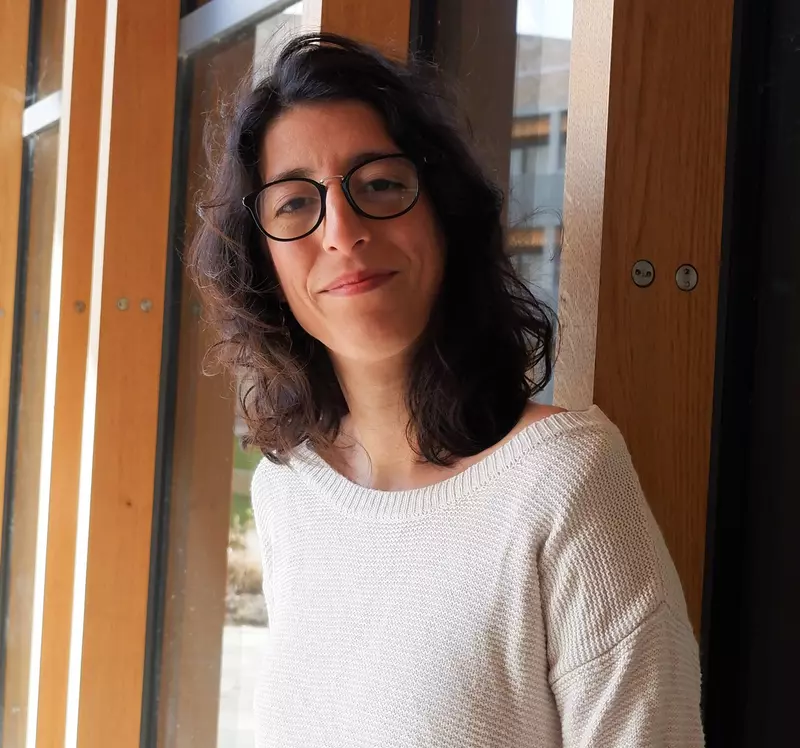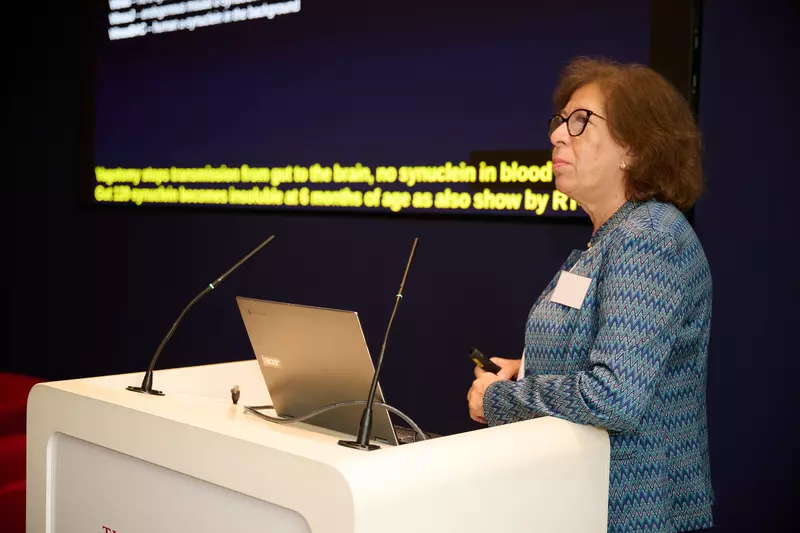Leading the way: what’s it like to be a woman in Parkinson’s research?
This International Day of Women and Girls in Science we celebrate two exceptional women who are driving Parkinson’s research forward. From leading a laboratory, to just getting started, Professor Maria Grazia Spillantini and Dr Marta Camacho share their thoughts on what it means to be a woman in Parkinson’s research.
Professor Maria Grazia Spillantini has been based in the Department of Clinical Neurosciences at the University of Cambridge since 1996. She led pioneering work to identify a protein, alpha-synuclein, which transformed our understanding of Parkinson’s. Now, Maria Grazia oversees the Spillantini lab, steering a team of researchers in their efforts to understand the causes of conditions such as Parkinson’s.
Just across the hallway in the Department of Clinical Neurosciences is Dr Marta Camacho. On completing her PhD in 2024, Marta was awarded a Parkinson’s UK Research Fellowship to continue on her research journey and establish an independent research group of her own. Whilst at different stages of their careers, both Maria Grazia and Marta are leading the way to expand our understanding of how the gut may play a role in Parkinson’s.
Marta, you’re just starting out in your research career. What inspired you to do Parkinson’s research?
Marta: I did my university degree in Neuropsychology and then specialised in working with older adults. Just by chance, I started working on research projects focused on eating behaviour and dopamine. This gave me the opportunity to work more closely with people with Parkinson’s and their families. I loved this interaction, and I was really interested in exploring the mechanisms of Parkinson’s. When I decided to do my PhD, I knew I wanted to study Parkinson’s.

Maria Grazia, how have you seen representation of women in science change over your career?
Maria Grazia: Over these last 25 years, there are many more women in research in general, but also in Parkinson’s research. For almost 20 years, from 1996 to 2015, I was the only woman in my department with a permanent job position. All the other permanent staff were men.
I entered the field of Parkinson’s by chance when we found alpha-synuclein. From that moment, Parkinson’s became my main interest. It’s very interesting because there are so many possibilities for how the condition develops, and I’ve had many PhD students and postdocs in my lab that have been involved in the study of Parkinson’s.
It is really nice to meet groups of young, clever investigators that have a lot of enthusiasm, like Marta. Speaking from my experience, we are perhaps not so confident and therefore more open to discussing our results with others and work in a more collaborative way.

Marta: I’ve noticed that whenever my supervisor, Dr Caroline Williams-Gray, and I put out a job advertisement, it’s mainly women who apply. I wonder, are there now more women in research, or actually do women tend to apply to a job that is led by another woman? What’s your experience of this as someone who has been leading the way in Parkinson’s research Maria?
Maria Grazia: I think it depends on the position. For PhDs, there are many women who apply, but they don’t always continue in academic positions. Over the years it has become quite clear that more people, especially men, are leaving academia because of job security, especially at the beginning.
Marta: That’s a very good point. Men may be more likely to pursue better paying jobs with better job security. I have always been very transparent when talking about salaries, career progression and my goals.
"A few years ago, I was chatting with a male colleague who had the same job title as me but had slightly less experience, and was surprised to learn that he earned more than me. I thought, how is this possible? And he said he’d asked for a raise. And so I asked for a raise and I was given one, but I was also told ‘You’re the first woman in our group to ever ask for a raise'". - Dr Marta Camacho
Marta, when you applied to your position in Caroline’s lab, was working with another woman in science a priority for you?
Marta: Not initially, I knew I wanted to work in Parkinson’s and that was my drive.
At that time, Caroline was a female scientist on the rise, and I did find it inspiring and wanted to be part of that journey. She helped me progress, and now I can pay it forward and start to hire PhD students and be as supportive and collaborative as others who came before me.
What impact has Parkinson’s UK funding and support had on your careers?
Maria Grazia: I think Parkinson’s UK is the most important agency for the study of Parkinson’s in the UK and among the most important internationally. I have been involved with Parkinson’s UK since 2000. The charity is very open to ideas, you can really discuss the research grant with scientific experts and people with Parkinson’s. When we apply for a research grant, it’s important that the Parkinson’s community help shape the research. Parkinson’s UK is always ready to help with this. I have been really impressed with the feedback I get from people with Parkinson’s.
Marta: I agree, I’ve been working with Parkinson’s UK for several years now. I’ve been involved in my local branch and have been helping spread the word about research. The local branches empower people with Parkinson’s to hear more about research, and I give talks at these branches. I enjoy getting that connection with the Parkinson’s community.
From a career perspective, I am very grateful to Parkinson’s UK. My PhD showed that methane in the gut was linked to memory and thinking problems in Parkinson’s, a finding that contradicts previous research. This was really puzzling, and I think other funders would have hesitated to support further research. Parkinson’s UK involves people with Parkinson’s in their funding decisions, and they were just as puzzled as me about my research question. They took a chance on my project and I was granted the fellowship to continue my research. That’s why I consider Parkinson’s UK to have given me my big break.
Both of your research projects are looking at the role of the gut in Parkinson’s. How do your 2 projects complement each other?
Marta: Even before I started on my PhD, I was fascinated by how the gut and the brain interacted with each other. Not only how these organs communicate, but how they affect each other to such a significant degree. During my PhD we saw that constipation was a risk factor for the progression of Parkinson’s, which makes sense because we already knew that it was a risk factor for the development of Parkinson’s. So constipation seems to accelerate the progression.
In my work now, I’m looking at constipation in people with Parkinson’s, and asking people to measure the methane in their breath and take thinking and memory tests.
Maria Grazia: There’s been a lot more interest in the gut and Parkinson’s research recently. Lots of people ask me questions because they are not aware. We’re looking at how the gut and the brain are connected by studying mice, and seeing if there are conditions in the gut that make the spread of the alpha-synuclein protein more likely, or cause more damage. We also look at constipation in the mice, using the same tests that Marta uses in patients!
The work that Marta and Caroline are doing with people with Parkinson’s is really important. You can connect what they are doing to the basic science that we are doing.
Marta: That’s the other thing I love about research involving the gut. What we’re doing can feed into Maria Grazia’s work and what she’s doing to understand how Parkinson’s starts, or develop treatments for the future. But researching the gut means we can also suggest changes that could help people today. If someone taking part in our research study is constipated, we can help them make changes right now that could improve their every day.
Maria Grazia, what does it mean to you to hear stories like Marta’s?
Maria Grazia: It’s amazing. She has been very successful already and her work is great. What’s nice is that the passion and interest is there, she has the drive and motivation that you need to have. I think having determination and curiosity is the only way to do science. I am very happy that she has got the Research Fellowship, she deserves it.
What advice might you give to others hoping to start a career in research?
Maria Grazia: I come from a tiny village in the mountains in Tuscany and I was the first person to go to university in my family. I would never have expected to arrive here at Cambridge and become a Professor. But I just followed what I liked. When I was at school I used to ask questions, my curiosity took over.
Being a researcher is not easy. It is up and down and involves long hours working. But it’s a matter of passion. We are very lucky because for us, research doesn’t feel like it’s a job. It’s almost a hobby. But if you don’t have the drive, it can be daunting.
Marta: When I saw you were going to ask for advice, I thought my goodness, what kind of advice can I give? But it’s what Maria said, you have to have the drive and passion. When the experiments in the lab don’t work and you don’t know why, it’s the passion of ‘I want to know the answer to my question’, or ‘I want to contribute to clinical improvement’ that sustains you.
Find out more about our funded researchers
Dr Marta Camacho is one of the recipients of our Senior Research Fellowship awards, which recognises her outstanding work so far and her potential as a future leader of Parkinson's research. Read more about this, and another new Fellow Dr Shenghong He, in our news story.

